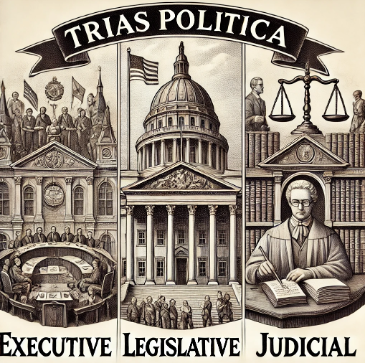Trias Politica
(Published in the newspaper Amigoe on the 6th of November 2024)
Democracy is facing tough times globally. Democracies are struggling, and autocracies are on the rise. Democracy isn’t something you just get; you can lose it. This series will explore this. In the first part, we’ll talk about the Trias Politica, which is the foundation of democracy. Then, in the second part, we’ll dive into democracy itself and the institutions that make it work. And finally, in the third part, we’ll look at how democracy can decline and how we can prevent it.
Trias politica en democratie
In a democracy, the people are the bosses. Democracies are based on the idea of the Trias Politica, which means the government is divided into three separate branches to keep each other in check. This way, no single branch can get too powerful and abuse its authority. The three branches are:
- Legislative power: it draws up the laws. Think of Parliament.
- Executive power: it governs the country within the framework of the laws. Think of the government.
- Judiciary: it tests the implementation on the basis of the laws. Think of the judges.

Trias Politica
The practice of the Trias Politica
In reality, the separation of powers isn’t always as straightforward as it seems. For instance, in the Netherlands and Curaçao, the parliament (the legal authority) and the government (the executive power) work together to draft laws. So, there’s no strict separation between implementing and making laws. In Curaçao, the parliament is also known as “de Staten.”
Let’s talk about the judiciary. Judges and the Public Prosecution Service, which is part of the Ministry of Justice, work together to exercise judicial power. The judiciary is called the "sitting magistracy", and the Public Prosecution Service is called the "standing magistracy". But here’s the thing, there’s no strict separation between the executive and the judiciary powers in this case.
The Trias Politica and dualism
In Curaçao, there’s a lot of buzz about dualism. But what is it? Dualism is all about dividing tasks between the government and parliament. The government is in charge of doing the work, and the parliament is in charge of making sure the government is doing it right. So, the government makes the rules, and the parliament checks the rules. It’s like a system of checks and balances. This idea of dualism is meant to make politics more transparent, which is in line with the spirit of the Trias Politica, where the separation of powers is super important. Now, here’s something to keep in mind: in our representative democracy, the people elect the parliamentarians. But the ministers are not elected by the people. They’re chosen by their party. So, the people should have the final say, not the ministers.
In the Netherlands and Curaçao, we have a dualistic system. Ministers therefore can’t sit in parliament. If they did, they’d have to check their own work as ministers. That way, the strict separation between doing the job and checking it would be gone. And that goes against the Trias Politica, which says that ministers should be in charge of doing the job and the Parliament checking it. So, because ministers can’t sit in parliament, the separation between doing the job and checking it is actually promoted. And guess what? There’s no discussion about this on Curaçao!
The talk about Curaçao centers around the parliamentarians who make up the coalition. In a dualistic system, the parliamentarians can criticize their own party’s ministers and also the ministers of the other coalition parties. The folks who believe in dualism think that this is the only way to make sure that the government actually does what it says it will do, which is what the Trias Politica is all about.
Those who disagree with this view believe that parliamentarians from their own party and coalition partners should be loyal to their ministers. They argue that even if ministers make mistakes, they shouldn’t be criticized or punished harshly. They believe that a dualistic system would weaken the government’s stability.
The Trias Politica and democracy
The Trias Politica is all about dividing powers. So, we need ways to keep that foundation strong. This way, no single government body gets too much power. In a healthy democracy, there are enough checks and balances to keep things in check. But we’ll dive deeper into that in the next article!
1. Trias Politica